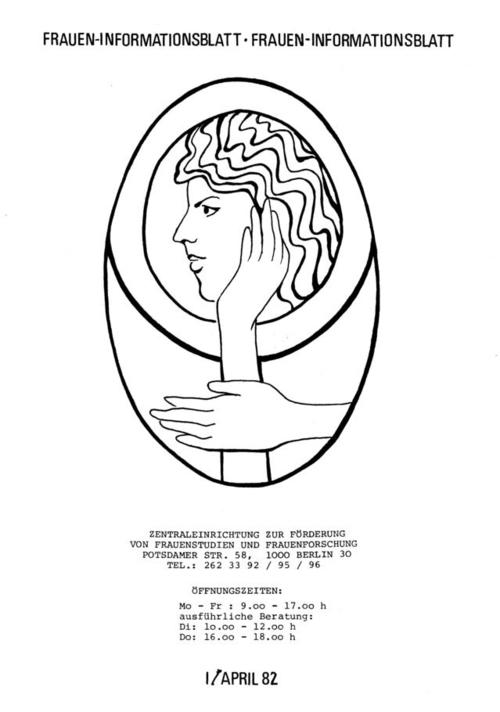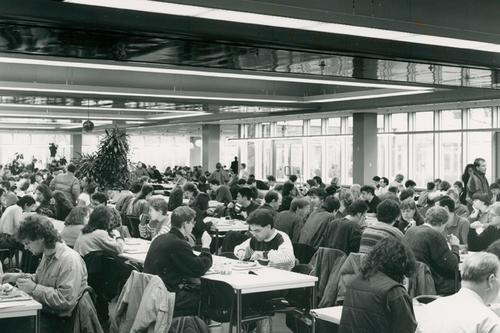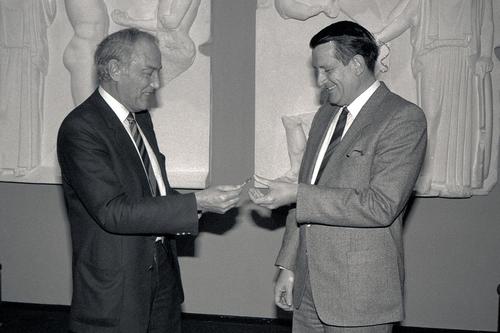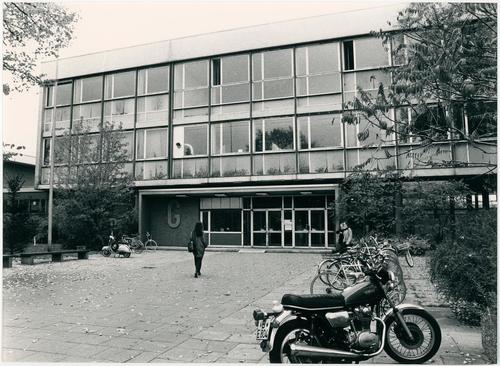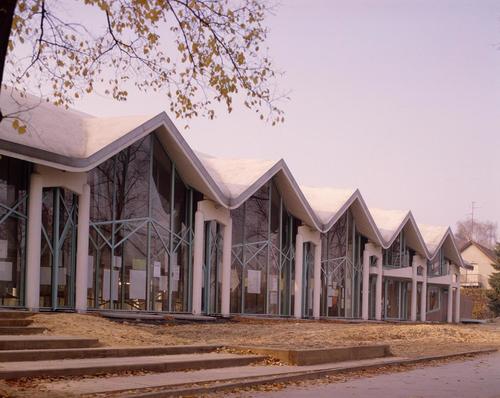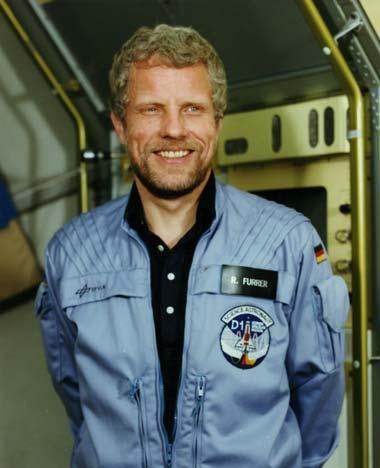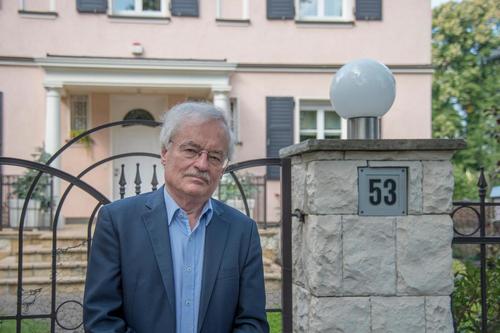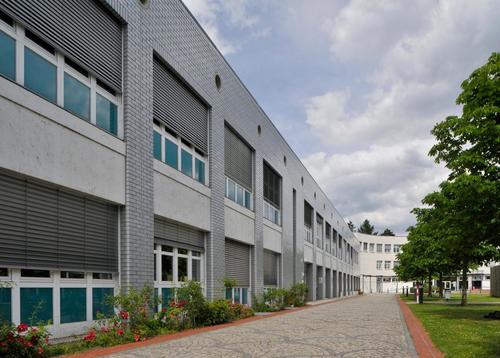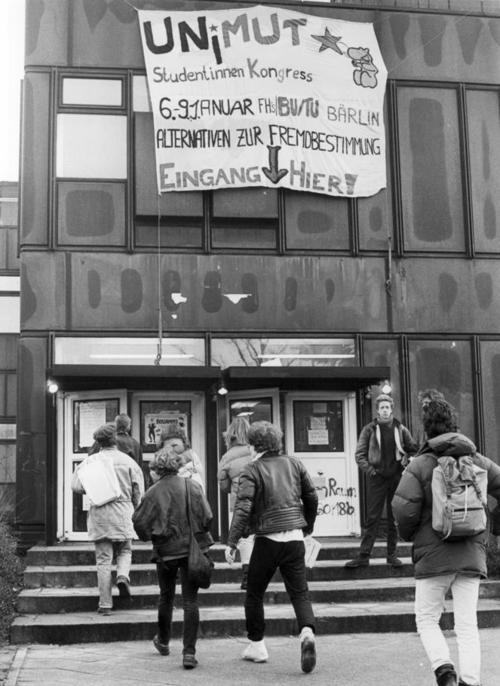The 1980s
Fall 1981
The first information sheet for women issued by the Center for the Promotion of Women’s and Gender Studies (ZEFG)
Image Credit: Margherita-von-Brentano-Zentrum
The Center for the Promotion of Women’s and Gender Studies (ZEFG) was founded. At the time it was one of the first institutions of this kind at a university in West Berlin and in the entire German Federal Republic. The establishment of this center was preceded by two decades of protests against male dominance in science and academia as well as the underrepresentation of women in research and teaching. Since 2016, the Margherita von Brentano Center has been continuing the work of the ZEFG, bundling the activities at the university on gender studies and related teaching. The photo shows the first issue of the women’s information sheet published by ZEFG in the summer of 1982.
January 1983
New dining hall, Mensa II, on Otto-von-Simson Strasse
Image Credit: Freie Universität Berlin / Universitätsarchiv
A new dining hall, Mensa II, was opened in the newly built Silberlaube complex on Otto-von-Simson Strasse (architect: Reinhard Gerhard Rümmler) with space for 1500 people. Mensa II serves 5,000 meals every day; since 1996 they have made efforts to include organic ingredients; and in 2010, they started offering vegan options.
May 1983
Former and new president of Freie Universität: Eberhard Lämmert (at left) and Dieter Heckelmann
Image Credit: Reinhard Friedrich / Freie Universität Berlin
Civil law professor Dieter Heckelmann (at right) became the new president of Freie Universität. Photo: the transfer of office from Eberhard Lämmert to his successor. The ongoing dispute between the political groups in higher education came to an end during Heckelmann’s presidency. The Executive Board included vice presidents from all the groups of professors. Heckelmann remained in office until 1991. A CDU politician, he was a Berlin Senator for the Interior from 1991 to 1996. He left politics in 1999.
1983
Several institutions moved from Dahlem to the campus of the former teacher training college in Lankwitz. By 2004 the campus for Earth sciences was settled there. The Institute for Media and Communication Studies was located there temporarily, but in 2007 it relocated to Dahlem. Between 2009 and 2012 the University Archives moved to Lankwitz.
July 1, 1983
A new building was constructed for the Institute of Philosophy at Habelschwerdter Allee 30
Image Credit: Reinhard Friedrich
Official opening of the new building of the Institute of Philosophy by the managing director Margherita von Brentano at Habelschwerdter Allee 30. Designed by the architects Hinrich and Inken Baller, the building has one story facing the street and three stories facing Triest Park. Thanks to its height and the roof, which is accented with gable curves, it is adapted to the villa architecture of its surroundings.
1984
The “University Lecture Series” was started. In 2004 it became the “Open Lecture Halls” series. The interdisciplinary lectures are aimed at students from all the departments as well as the general public. Each semester they supplement the range of courses in the degree programs.
Fall 1985
Physicist in space: Reinhard Furrer, who as a student at Freie Universität helped dig tunnels under the Berlin Wall to aid people in escaping from East Berlin, orbited the Earth 112 times from October 30 to November 6, 1985, on board the US space shuttle Challenger. In 1987, Furrer accepted a call from Freie Universität for a professorship in space technology. In 1995 he died in a plane crash.
April 1986
The founding director of the Environmental Policy Research Center, Professor Martin Jänicke
Image Credit: Bernd Wannenmacher / Freie Universität Berlin
The Environmental Policy Research Center was set up at Schwendener Strasse 53 (today: Ihne Strasse 22). The picture shows founding director Professor Martin Jänicke, a political scientist and policy advisor. The interdisciplinary research institute was founded three days before the accident of the Chernobyl nuclear reactor. It serves as a condensation point for environmental social science research at Freie Universität and is networked with numerous political institutions and partner institutes worldwide.
Summer 1986
The Institute of Computer Science was founded in the Department of Mathematics. A degree program in computer science had already been set up the year before. In 1993 the institute moved into the new building at Taku Strasse 9. It was designed by the architects Baesler Schmidt und Partner.
Winter Semester in 1988/1989
UNiMUT strike: Students protested against overcrowded lecture halls, plans to dissolve and merge certain institutes, poor support for training and education, and disadvantages for women in hiring. Project tutorials (as of 2002/2003: “study projects”) dated back to the demand for self-determined learning and a critical examination of existing academic practices. Student-led courses to accompany seminars were intended as a supplement to the regular range of courses.

